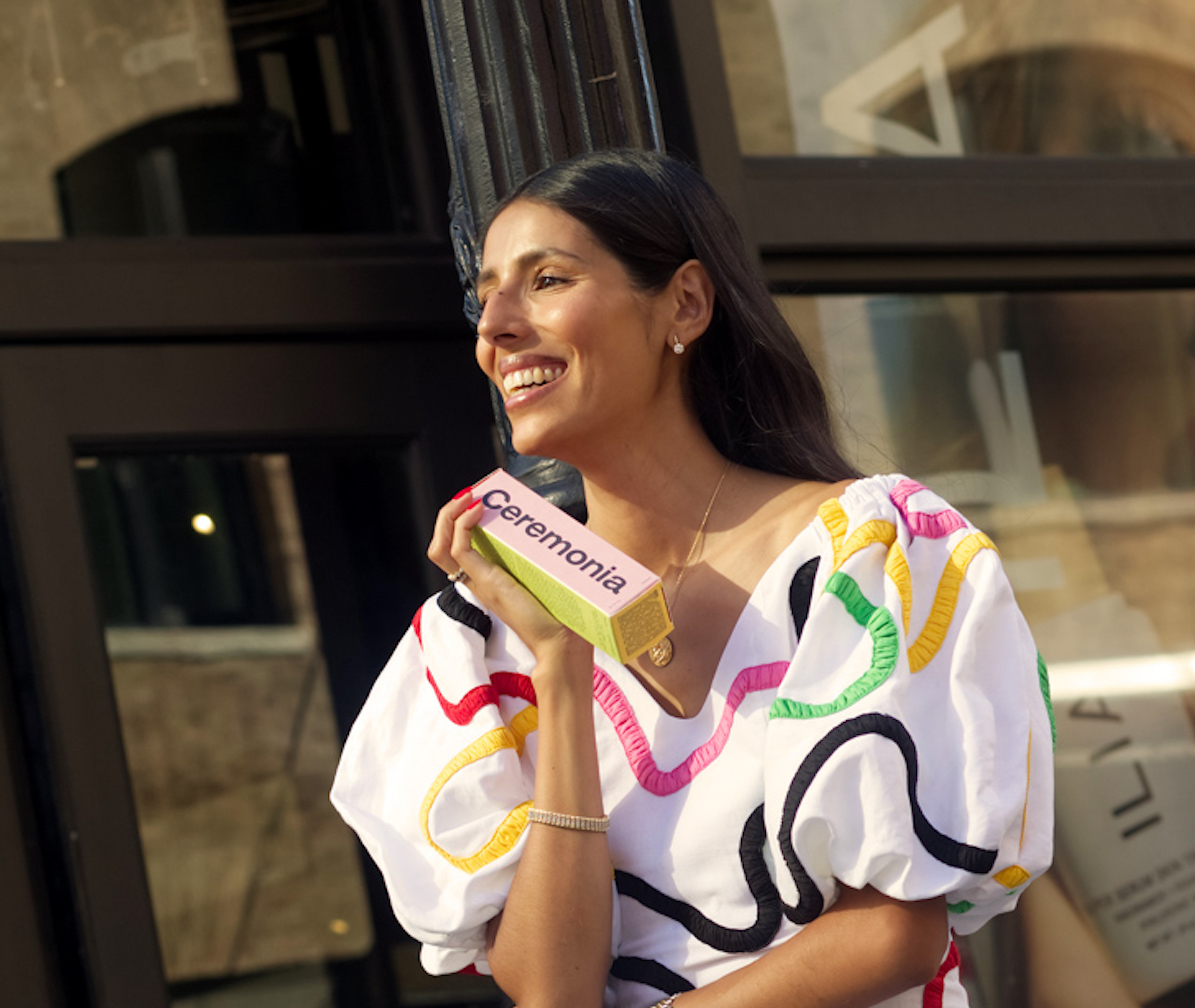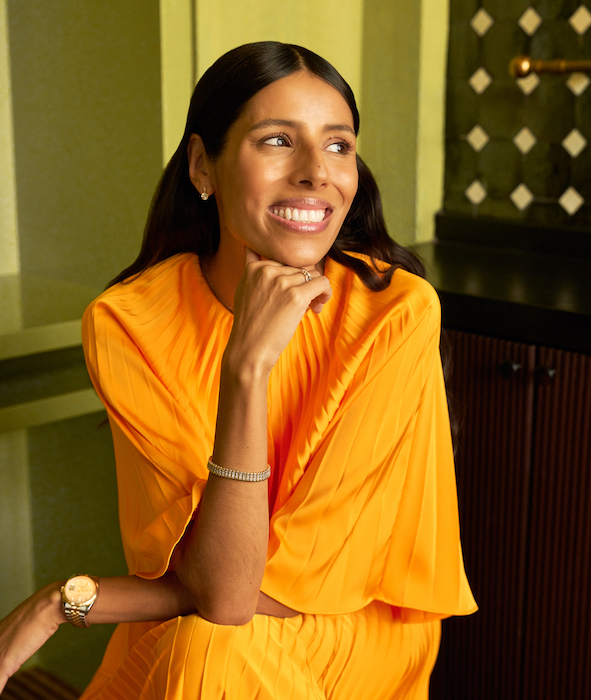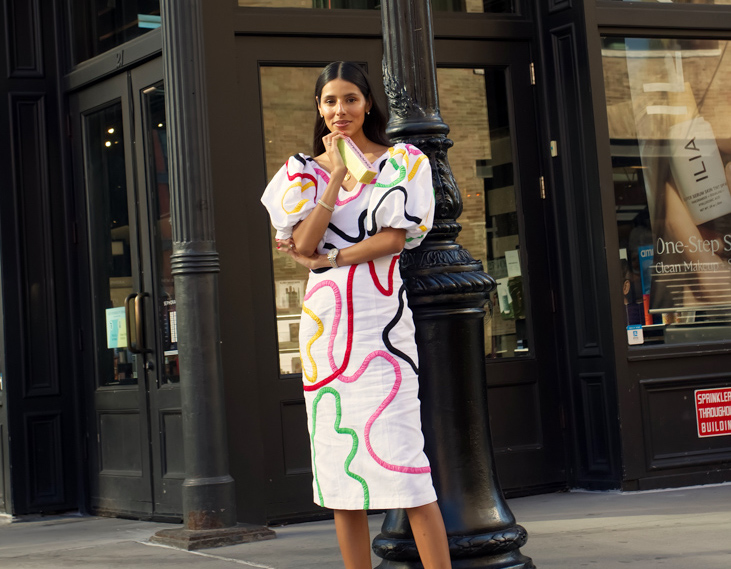
How Ceremonia Founder Babba Rivera Champions Latinidad in Beauty
August 8, 2022
Rana Good is the founder of Naïra NYC. A writer for publications such as Forbes, Travel + Leisure, Coveteur, Mens Journal and others, she created her own platform celebrating women of color.
Babba Rivera always wanted to found a beauty brand tied specifically to her Latin background. Growing up in Sweden she didn’t see herself represented in media or in beauty products, so she knew she wanted to change that.
Fast forward to 2020, Rivera is working on launching clean, Latinx-inspired beauty brand Ceremonia and COVID-19 hits changing everything from supply chain to investors pulling out their potential investments for the brand. While facing the struggles of a worldwide pandemic, Rivera regrouped and still managed to launch Ceremonia in October 2020 to much success. The brand just launched on Sephora.com and has continually added new products such as Pequi Styling Gel or Guava Beach Waves Spray.
We spoke to Rivera about how she brought Ceremonia to fruition during challenging times and her business advice for women of color.
How did you bring Ceremonia from the idea stage to launch?
Babba Rivera: It took a lot of dedication. Nothing will happen on its own, persistence is what sets entrepreneurs apart from people with an idea. It doesn’t matter how you’re feeling, every day you need to ask yourself “What’s the most impactful thing I can do today to get closer to my goal?” Entrepreneurship is not compatible with procrastination. I started fundraising for Ceremonia and then the pandemic hit. I had almost 1 million dollars confirmed and then everyone took back their offers. It was so stressful and I was pregnant at the time but I understood it, I also stopped doing investments. In those situations, you can either give up on it a little bit or keep adapting, which is what we did. I think that’s why we have a very agile team today.
What vibe did you want to embody with the branding and look of Ceremonia?
It was inspired by different elements of Latin culture; the color-blocking and our labels were inspired by old San Juan where all of the buildings have different colors. Inside of our boxes, we feature our ingredients but the print resembles the oil cloths you see in street restaurants in Latin America. It’s usually done with flowers but we did that with our ingredients. We wanted to bring in elements of Latin culture but modernize it for the world stage.

For women of color who want to launch a business, what advice do you have?
Many founders are told to take money from their friends and family initially, but I think many women of color are in a situation where their friends don’t necessarily have hundreds of thousands of dollars sitting around.
It’s funny because when we were doing our friends and family fundraising, I looked at the list and said there’s no one on here that’s a friend or family. They’re my industry friends. Many people who go to Ivy League schools have access to capital through who they met there, like “Oh my buddy’s dad can give me money.” I don’t have friends like that.
My biggest tip when it comes to fundraising is to have a mindset shift. A lot of people find it scary and operate from a place of need. Instead, you should think you’re presenting them with a business opportunity and that people are going to want to invest. Present yourself from a place of power rather than need. I think women of color are often approached with more skepticism when it comes to fundraising, I’ve experienced that too. Even though I have a proven track record, I helped launch Uber in Sweden where it became one of the fastest growing markets, helped build Away which is a billion-dollar company, and worked with Glossier and Hermes, I was still met with hesitation. That happened even though I’ve built companies and teams before but what about people who haven’t worked at these types of companies? Investors are still stuck to who they know and often it’s people who look like them. What I did is have a lot of data in my deck, and I invested my own capital into insights. I built my entire deck around how underrepresented the Latinx population is. I approached it from a numbers perspective rather than an inequality perspective. We make up 20 percent of the U.S. population and spend 46 percent more on haircare products, we’re early adopters and the youngest population. There aren’t that many Latin-founded businesses speaking to this group.
What are some of the challenges you faced launching a brand during Covid?
The main thing was the uncertainty, if we would have known it was two years, it would have helped but in the beginning, it was a month, then two months, then so much short-term planning. The other issue we faced was the supply chain. We were able to set up a very covid-friendly system, we produce our formulations on the east coast and we have our own research and development lab. Since Covid started customer acquisition cost has also increased by 50 percent but we’ve seen the most success in building our community.

Ceremonia has now been in business for just under two years, what have been some of your biggest learnings as an entrepreneur?
I’m learning all the time, I’m a student of life. In the role of a founder, you have to reinvent yourself over and over again. What I was doing six months ago is not what I’m doing today.
Sometimes as a founder, you’re too hard on yourself, I really strive for greatness and I hold everyone to really high standards. I only work with people who I see something in, sometimes I see something that they might not even see in themselves.
Who are some Latinx founders you admire?
I love what Cami Tellez is building with Parade and I’ve really enjoyed getting to know her. I really admire Eva Goicochea from Maude which is a sexual wellness company, she’s one of a few Latinas to raise a lot of money for her business and is the first sexual wellness company carried at Ulta. I also love Cyndi Ramirez and what she’s created with Chillhouse
Where do you want to see Ceremonia go, what are some of your short-term and long-term goals?
I see Ceremonia becoming much more than a haircare brand. We’re really reinventing how product development is done and do it fully in-house. At the same time, we’re also really pushing the boundaries for what it means to be Latinx today. I see us becoming a category leader in beauty and putting Latinidad as a brand on the map. We also really champion hair health rather than just beauty. When I started my brand I had a bob and now my hair is so long. We pride ourselves on packing our products with nutrition for your hair. It’s just like how skincare and makeup are merging for many brands, that’s what we’re doing for hair.
Featured Photo of Babba Rivera by Rebecca Alaniz